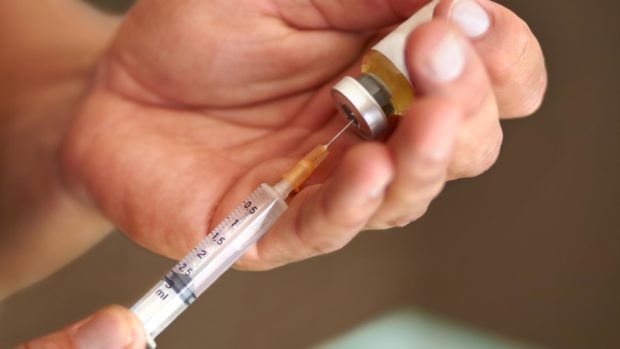
INQUIRER.net Stock Photo
MANILA, Philippines — The Department of Health (DOH) on Wednesday said the process of procuring COVID-19 bivalent vaccines hit a “roadblock” as the government decided to not extend the coronavirus-induced state of calamity edict.
Bivalent vaccines are a type of vaccine that targets specific variants of COVID-19 such as the more transmissible Omicron.
“Patuloy po ang ating negotiation in terms of bivalent vaccines. Kailangan lang po natin [busisiin] maigi itong proseso dahil meron lamang tayo na-meet na roadblock in this state of calamity na hindi po na-extend,” DOH officer-in-charge Undersecretary Maria Rosario Vergeire disclosed during an interview over TeleRadyo’s program Sakto.
(Our negotiation in terms of bivalent vaccines continues. We just need to thoroughly study this process because we have only met a roadblock in this state of calamity that was not extended.)
According to Vergeire, the non-extension of the state of calamity declaration means the DOH now has to revert to the usual process of procurement – which takes longer because the DOH is no longer eligible to make emergency procurement.
“Ito pong usual process of procurement kasi under Republic Act 9184 (Government Procurement Reform Act), ay hindi ganoon kabilis katulad ng emergency procurement, na nagagawa natin noong may state of calamity tayo,” Vergeire explained.
(Because the usual process of procurement under Republic Act 9184 is not as fast as emergency procurement, which we were able to do when we have a state of calamity.)
Nevertheless, Vergeire assured the public that while negotiations continue, they are also looking for ways to make the country’s acquisition of bivalent vaccines faster.
She further revealed that some countries have already offered to donate doses of the bivalent vaccines to the Philippines, including the World Health Organization’s COVID-19 Vaccines Global Access or COVAX facility.
Also, Vergeire said that the government’s target schedule to start providing bivalent vaccines to the public remains – in the first quarter of 2023. She noted that bivalent vaccine donations will most likely arrive in the Philippines ahead of the doses that the government – through the DOH – will directly procure.
Vergeire likewise gave assurance that bivalent vaccines are safe to use, citing the US Centers for Disease Control and Prevention and Food and Drug Administration which had determined that bivalent vaccines and monovalent vaccines (the type of vaccine more widely used) have the same adverse reactions.
“So tuoy-tuloy lang po ako pagbabakuna, ang adverse reaction po ang risk andiyan, pero mas mataas po ang risk kung kayo ay magkakasakit ng COVID-19,” she said.
(So the vaccination will continue, the risk of adverse reaction is there, but the risk is higher if you get sick with COVID-19.)
‘Current vaccines equally effective as bivalent vaccines’
Vergeire then reminded the public that the currently available vaccines against COVID-19 are just as effective as the bivalent vaccines.
READ: What to know about ‘bivalent vaccines’ that target Omicron
“Ito pong bivalent vaccines ay makakapagbigay sa’tin ng karagdagang proteksyon, pero ito pong mga bakunang meron tayo ngayon, ito pong mga monovalent vaccines ay equally effective at makakapagprotekta sa inyo laban sa severe at critical infections,” she pointed out during the same interview,
(These bivalent vaccines can give us additional protection, but the vaccines we have now, these monovalent vaccines, are equally effective and can protect you against severe and critical infections)
“So instead of waiting for the bivalent vaccines, ako po ay nagpapayo na tanggapin na po natin kung ano ang bakuna na meron tayo ngayon dahil ito rin po ay epektibo,” she added.
(So instead of waiting for the bivalent vaccines, I am advising that we accept the vaccine that we have now because it is also effective.)
RELATED STORIES
Gov’t urged to partner with private hospitals on bivalent vaccines
Bivalent COVID-19 vaccine will reassure investors, boost PH economy – Concepcion